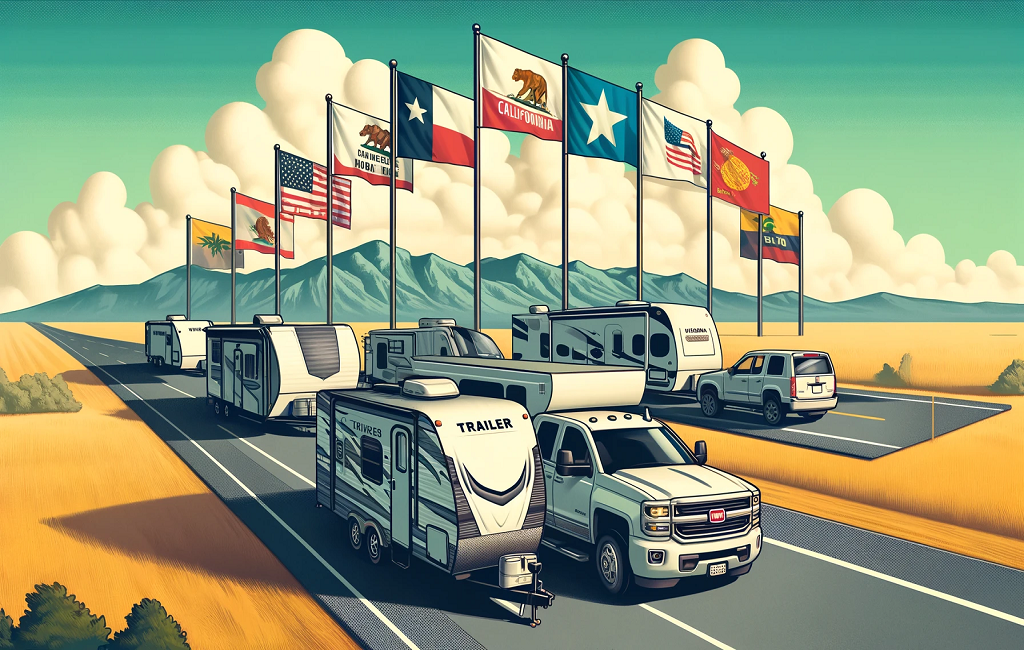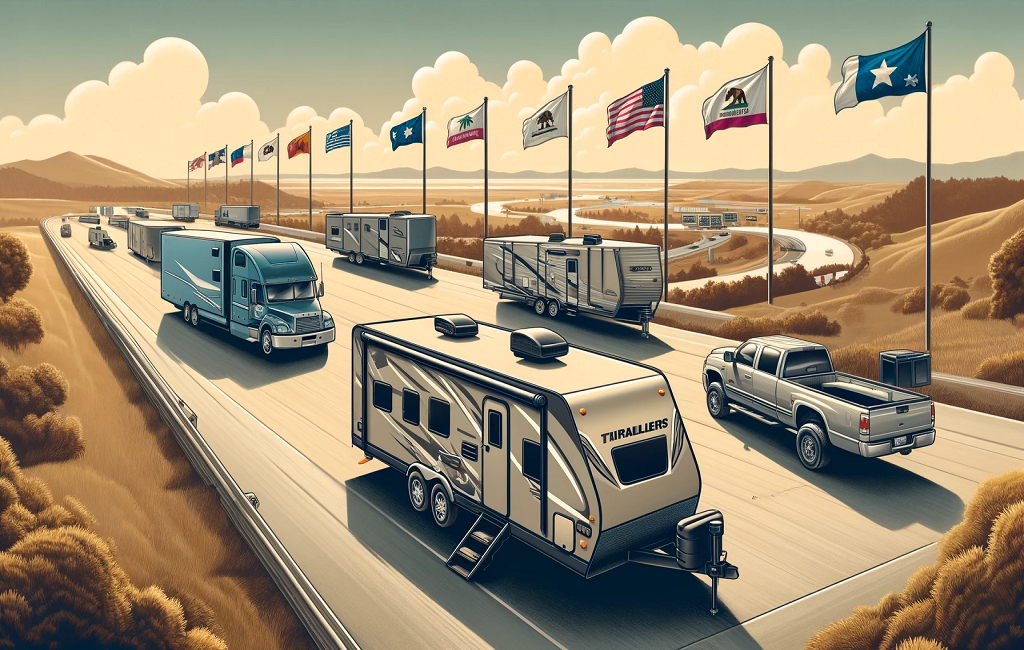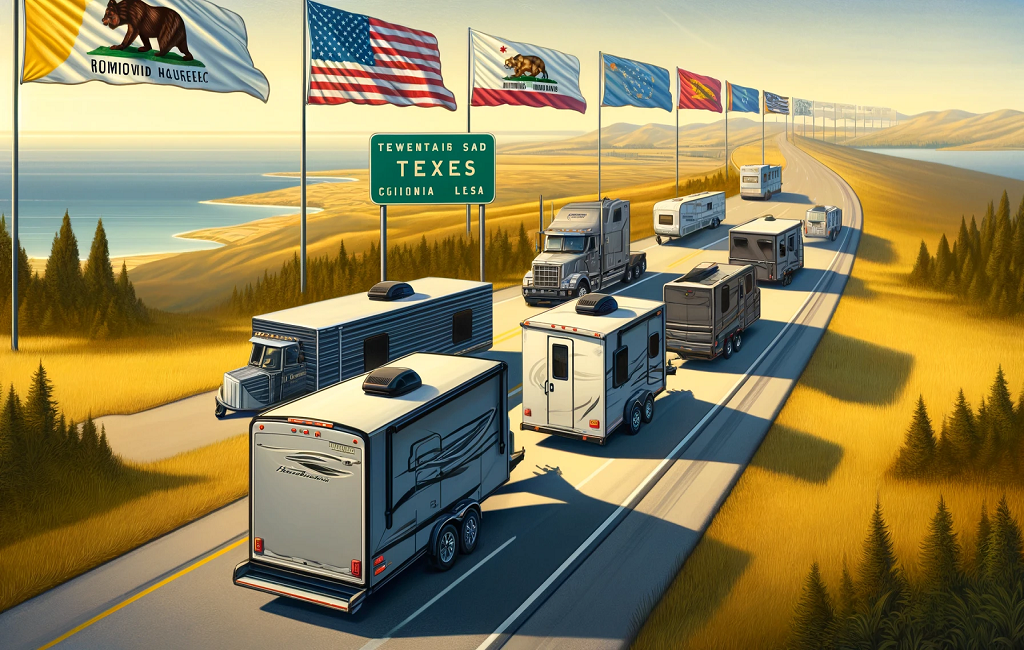
Trailer insurance is essential for anyone who owns or operates a trailer. Trailers come in various types, including travel, utility, and boat trailers, each serving different purposes. While some states mandate insurance for trailers, others leave it optional. Regardless of the legal requirements, having appropriate insurance coverage can protect you from significant financial losses in accidents, theft, or damage.
In this comprehensive guide, we will delve into the details of trailer insurance, exploring which states require it and the factors that influence these requirements. We will also provide practical advice on choosing the right insurance policy to ensure you are adequately protected. Whether you are a seasoned trailer owner or considering purchasing one, understanding the nuances of trailer insurance is crucial to safeguarding your investment and peace of mind.

Table of Contents
Understanding Trailer Insurance
Definition and Importance
Trailer insurance is a type of coverage designed to protect trailers and their owners from potential risks, including accidents, theft, and damage. It ensures that any financial losses related to the trailer are covered, reducing the owner’s burden. Given the varying types of trailers and their uses, having the right insurance coverage is crucial to avoid unforeseen expenses and liabilities.
Types of Trailer Insurance
- Liability Coverage: This type of insurance covers the costs of injuries or property damage caused by your trailer. It is essential if your trailer causes an accident, as it helps cover the legal and medical expenses of third parties involved.
- Comprehensive Coverage: Comprehensive coverage protects your trailer from non-collision-related incidents such as theft, vandalism, fire, or natural disasters. This type of insurance ensures you are compensated for the repair or replacement costs if your trailer is damaged or stolen.
- Collision Coverage: Collision coverage pays for damages to your trailer resulting from an accident, regardless of who is at fault. It covers the repair or replacement costs if your trailer collides with another vehicle or object.
- Uninsured/Underinsured Motorist Coverage: This coverage is essential if your trailer is involved in an accident with a driver who does not have sufficient insurance. It helps cover the repairs or medical expenses that the other driver cannot pay.
Understanding these types of trailer insurance can help you choose the coverage that best suits your needs. In the following sections, we will explore the state-specific requirements for trailer insurance and offer guidance on selecting the right policy for your situation.
State Requirements for Trailer Insurance
Overview of State Regulations
Trailer insurance regulations vary significantly across the United States. Each state has its laws determining whether trailer owners must have insurance and what types of coverage are required. These laws are often influenced by factors such as the type of trailer, its intended use, and the potential risks associated with its operation.
States That Require Trailer Insurance
While not all states mandate trailer insurance, several have specific requirements based on the trailer type and use. Here are some notable examples:
- California: In California, liability insurance is mandatory for all trailers operated on public roads. This requirement ensures that any damage or injuries caused by the trailer to third parties are covered.
- Texas: Texas requires all trailer owners to have liability insurance if their trailer exceeds a certain weight limit. This ensures that owners can cover any damages or injuries their trailers might cause on the road.
- Florida: Florida mandates that commercial trailers be insured, particularly those used for transporting goods or people. The state requires minimum liability coverage to protect against potential legal and medical claims.
- New York: All registered trailers must have liability insurance in New York. This coverage is crucial for protecting the owner from potential liabilities in an accident involving the trailer.
- Illinois: Illinois requires liability insurance for all trailers that are registered and used on public roads. This helps mitigate the financial risks involved in trailer-related accidents.
States With Optional Trailer Insurance
In some states, trailer insurance is not mandated by law but is highly recommended. These states often emphasize the importance of having voluntary coverage to protect against unforeseen circumstances:
- Overview of States With Optional Insurance: In states like Ohio and Utah, trailer insurance is not a legal requirement. Still, owners are encouraged to purchase coverage to protect their assets and liability.
- Benefits of Voluntary Trailer Insurance: Even in states where it is not required, having trailer insurance can save owners from significant out-of-pocket expenses in the event of theft, damage, or accidents. It provides peace of mind and financial security, allowing trailer owners to enjoy their investment without worry.
Understanding the specific insurance requirements in your state is crucial for legal compliance and financial protection. The following sections will discuss how to choose the right trailer insurance policy based on these regulations and other personal considerations.

Factors Influencing Trailer Insurance Requirements
State Laws and Regulations
The primary factor influencing trailer insurance requirements is state legislation. Each state has its own set of laws that determine the necessity for insurance based on various risk assessments and the state’s legal framework. For instance, states with higher traffic volumes or higher incidences of trailer theft might require more comprehensive coverage to mitigate the risks associated with trailer usage.
Type and Usage of Trailer
The specific type of trailer and its intended use significantly affect insurance requirements. For example:
- Utility Trailers: Often used for hauling goods and equipment, these trailers might require different insurance based on their load capacity and the nature of the goods they transport.
- Travel Trailers and RVs: These are typically used for recreation. The value of the trailer and its contents often necessitates comprehensive collision coverage beyond primary liability.
- Commercial Trailers: Used by businesses to transport commercial goods, these trailers usually require more extensive liability coverage to protect against higher stakes involved in commercial transport.
Risk and Liability Considerations
Insurance requirements are also driven by the perceived risk and potential liability associated with trailer ownership and use:
- Accident Risk: Trailers that are more prone to accidents (due to size, design, or use) may require higher liability coverage to address potential damages or injuries caused by third parties.
- Theft and Damage Risk: Comprehensive coverage becomes critical in areas or for trailers at a higher risk of theft or damage (like luxury RVs or trailers used in high-crime areas).
Local Traffic Conditions
Traffic conditions and road quality in a particular state or region can also influence trailer insurance needs. States with poorer road conditions or higher accident rates might require additional coverage to safeguard against the increased risk of damage or accidents.
Legal Minimum Requirements
Lastly, the legal minimum requirements set by each state dictate the least amount of coverage a trailer owner must carry. These are typically liability coverages meant to ensure that the trailer owner can cover costs related to damages or injuries their trailer might cause to others.
Understanding these factors is crucial for trailer owners to assess their specific insurance needs. By considering state regulations, the type of trailer, usage patterns, and inherent risks, owners can choose the appropriate coverage that offers adequate protection while complying with legal obligations. In the next section, we’ll explore choosing the right trailer insurance policy that aligns with these factors and individual needs.
How to Choose the Right Trailer Insurance Policy
Choosing the right trailer insurance policy involves careful consideration of your specific needs, the requirements of your state, and the risks associated with your trailer’s use. Below are steps and tips to guide you in selecting the best policy for your situation.
Assessing Your Needs
- Identify the Type of Trailer: Understand the type of trailer you own—a utility trailer, travel trailer, or commercial trailer—as each type has different insurance needs.
- Evaluate Usage: Consider how often and how you use your trailer. Frequent or commercial use typically requires more comprehensive coverage than occasional personal use.
- Risk Assessment: Evaluate the risks associated with your trailer, such as exposure to theft, damage, or accidents, based on your geographic location and its usage.
Comparing Policies and Providers
- Shop Around: Obtain quotes from multiple insurance providers to compare rates and coverage options. Don’t just look for the cheapest policy; consider the coverage details and the insurer’s reputation.
- Read Reviews: Check customer reviews and ratings for insurance companies. Reviews can provide insight into the insurer’s customer service, claim handling efficiency, and overall satisfaction.
- Consult with Professionals: Talk to insurance agents or brokers who can provide expert advice tailored to your specific needs and help you navigate the complexities of trailer insurance.
Understanding Coverage Options
- Liability Coverage: Ensure that your policy includes enough liability coverage to protect against potential legal and medical claims if your trailer is involved in an accident causing injury or property damage.
- Comprehensive and Collision Coverage: Consider opting for non-collision-related incidents and collision coverage for accidents involving your trailer.
- Additional Options: Depending on your needs, look for additional coverage options like roadside assistance, coverage for contents inside the trailer, or uninsured/underinsured motorist coverage.
Tips for Getting the Best Rates
- Increase Deductibles: Opting for higher deductibles can lower your premium costs, but make sure you can afford the deductible in case of a claim.
- Bundle Policies: Consider bundling your trailer insurance with other policies (like auto or home insurance), as many companies offer discounts for multiple policies.
- Safety Features and Modifications: Inform your insurer about any safety features or modifications that reduce the risk of theft or damage, as these can often lead to premium reductions.
By carefully assessing your needs, comparing offerings from different providers, understanding the necessary coverage options, and employing strategies to reduce costs, you can choose the right trailer insurance policy that provides adequate protection and value. The following section will discuss standard coverage options for trailers and their benefits.
Common Trailer Insurance Coverage Options
Understanding the different types of coverage available when insuring your trailer is essential for making informed decisions. Here are some of the most common trailer insurance coverage options that you should consider to ensure comprehensive protection.
Liability Coverage
Liability insurance is perhaps the most crucial coverage for trailer owners. It covers the costs associated with damage or injuries your trailer causes to other people or their property. This coverage is mandatory in many states, and even where it isn’t, it provides essential protection against the potentially high costs of legal claims:
- Bodily Injury: This covers medical bills and legal costs if someone is injured by your trailer.
- Property Damage: Pays for repairing or replacing other people’s property damaged by your trailer.
Comprehensive Coverage
Comprehensive coverage protects your trailer from risks other than collision. This includes theft, vandalism, fire, natural disasters, and other non-collision-related damages. It’s precious for expensive or specialty trailers where replacement costs could be significant:
- Theft: Covers the replacement value of the trailer if it is stolen.
- Vandalism and Fire: Pays for repairs due to damage from vandalism or fire.
Collision Coverage
Collision coverage comes into play if your trailer is involved in a traffic accident, regardless of who is at fault. It covers the cost of repairing or replacing your trailer if it collides with another vehicle or object:
- Repair Costs: Covers the expenses to repair damages from a collision.
- Replacement: Provides funds for a new trailer if yours is totaled in an accident.
Uninsured/Underinsured Motorist Coverage
This type of coverage is crucial if you’re involved in an accident with a motorist who does not have sufficient insurance to cover the damages they caused. It helps ensure that you’re not left covering all the costs:
- Uninsured Motorist: Protects you if the other party in an accident has no insurance.
- Underinsured Motorist: Steps in when the other party’s insurance is insufficient to cover the full extent of the damage.
Optional Coverage Add-ons
In addition to the standard coverage options, many insurance providers offer additional protections that can be added to your policy:
- Roadside Assistance: Provides towing, flat tire changes, and other on-the-road help if your trailer breaks down.
- Contents Coverage: Essential for travel trailers, this covers the loss of personal belongings inside your trailer.
- Total Loss Replacement: This program offers the cost of a new, similar trailer if your trailer is declared a total loss.
Each coverage option provides a layer of financial protection and peace of mind. When selecting insurance for your trailer, consider the specific risks associated with how and where you use your trailer and the value of the trailer itself. Tailoring your coverage to your needs ensures you’re neither underinsured nor overpaying for unnecessary protection. In the next Theon, we will share unique insights and personal opinions on tailoring insurance policies to individual needs.
Unique Insights and Personal Opinion
The Importance of Tailored Insurance Policies
In the world of trailer insurance, one size does not fit all. Each trailer owner’s situation is unique, influenced by factors such as the type of trailer, its use, geographic location, and personal risk tolerance. Tailoring your insurance policy to fit these specific needs is not just prudent; it’s essential.
From my experience, I’ve observed that many trailer owners often overlook the importance of customized insurance. They either end up over-insured, paying for coverage they don’t need, or under-insured, leaving themselves vulnerable to significant financial risks. The right balance ensures you are adequately protected without wasting money on unnecessary premiums.
Balancing Cost and Coverage
Cost is a significant concern for most insurance buyers, but it should not be the sole factor in choosing a trailer insurance policy. The cheapest policy may save you money upfront but could cost you much more in the long run if it doesn’t cover all your needs. Conversely, the most expensive policy might include coverage irrelevant to your situation.
The key is to balance cost with coverage. Evaluate what you need to protect and compare policies that meet those needs within your budget. It’s often helpful to discuss your specific situation with an insurance advisor who can provide insights into what coverage is essential and what might be extraneous.
Personal Experiences with Trailer Insurance
From personal and professional interactions, I’ve noticed a trend where individuals either overly estimate or underestimate their risk levels. For instance, a friend once avoided purchasing comprehensive coverage for his travel trailer, seeing it as an unnecessary expense. Unfortunately, he suffered a significant loss when his trailer was stolen from a secure parking area. This incident was a harsh reminder of the importance of assessing risks realistically and preparing for worst-case scenarios.
Conversely, another acquaintance with a simple utility trailer used only a few times a year invested in extensive coverage due to overestimation of risk. While this person was well-protected, the premium costs were disproportionately high compared to the actual usage and risk.
Conclusion
Understanding your specific insurance needs and seeking tailored policies can improve financial protection and peace of mind. It’s crucial to strike the right balance between cost and coverage and review your insurance needs regularly as your circumstances change. Always aim to be informed, prepared, and prudent with your insurance choices to ensure that your investment in your trailer is well protected.
In the next section, we will delve into some of the most common questions related to trailer insurance to help clarify typical concerns and provide additional guidance.
Frequently Asked Questions (FAQs)
Are trailers required to be insured in Texas?
Yes, trailers used on public roads with a gross weight exceeding 4,000 pounds must be insured in Texas. The state requires minimum liability insurance to cover potential damages or injuries caused by the trailer. It is advisable to check with local authorities or an insurance advisor for specific requirements based on your trailer’s specifications and usage.
What kind of insurance do you put on a trailer?
The type of insurance you should put on a trailer depends on several factors, including its type, use, and the risks associated with its operation. Generally, the most common types of insurance for trailers include:
- Liability Insurance: Covers costs related to damage or injuries your trailer might cause to other people or property.
- Comprehensive Insurance: Provides coverage for non-collision-related incidents such as theft, vandalism, or environmental damage.
- Collision Insurance: Covers damage to your trailer resulting from collisions, regardless of who is at fault.
- Uninsured/Underinsured Motorist Coverage: Protects you if the other party involved in an accident does not have sufficient insurance.
It’s best to consult with an insurance provider for specific coverage suited to your needs.
Do I need trailer insurance in Illinois?
If your trailer is registered in Illinois, it must have liability insurance when used on public roads. This coverage is mandatory to ensure that any damage or injuries caused by the trailer can be compensated. Additional types of insurance, such as comprehensive or collision coverage, are optional but recommended depending on your trailer’s value and the risks it may face.
Is insurance required for a travel trailer?
The requirement for travel trailer insurance varies by state. In some states, liability coverage is mandatory if the travel trailer is towed on public roads. However, even in states where insurance is not legally required, it is highly advisable to have at least liability insurance. Additional coverage, like comprehensive and collision insurance, is recommended to protect your investment against various potential risks, including theft, natural disasters, and accidents.
These FAQs are designed to address the most common concerns about trailer insurance. Understanding these aspects can help you navigate the complexities of trailer insurance and ensure you are adequately covered according to your specific needs and local regulations. In the next section, we will summarize the key points covered in this guide.
Conclusion
Understanding the intricacies of trailer insurance is crucial for any trailer owner. Throughout this guide, we have explored the types of trailer insurance available, the states that mandate such insurance, and the factors that influence these requirements. We’ve also guided you on choosing the right insurance policy, balancing costs with coverage, and addressing common questions about trailer insurance.
Key takeaways include:
- State Regulations Vary: Knowing your state’s specific trailer insurance requirements is essential to ensure compliance and adequate protection. Some states mandate liability insurance for all trailers on public roads, while others may have more relaxed regulations.
- Types of Coverage: Owners should consider various insurance options, including liability, comprehensive, collision, and uninsured/underinsured motorist coverage. Tailoring your policy to your needs can provide better protection and save money.
- Importance of Tailored Policies: As discussed in our personal opinion section, the right insurance policy is not about having the most coverage but the correct one. Properly assessing your needs and risks and choosing a policy that addresses them without unnecessary extras is critical to adequate insurance.
- Regular Reviews Are Essential: Circumstances change, and so do insurance needs. Regularly reviewing and adjusting your trailer insurance policy ensures that your coverage remains relevant and cost-effective.
Considering these points, you can make informed decisions about trailer insurance, ensuring adequate coverage that provides peace of mind and financial protection. Whether you are a new trailer owner or looking to reassess your current insurance policy, this guide aims to provide the foundational knowledge needed to navigate the complexities of trailer insurance confidently.

